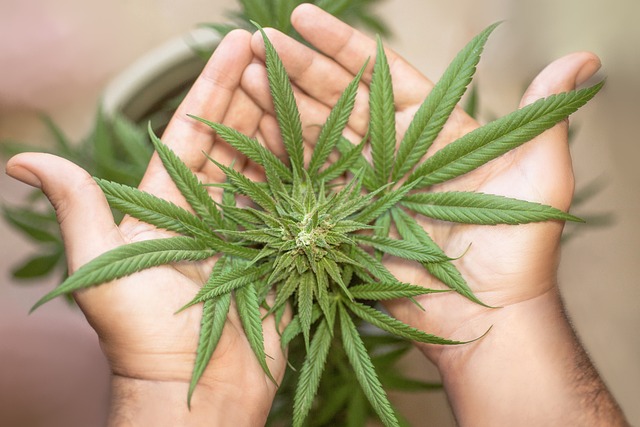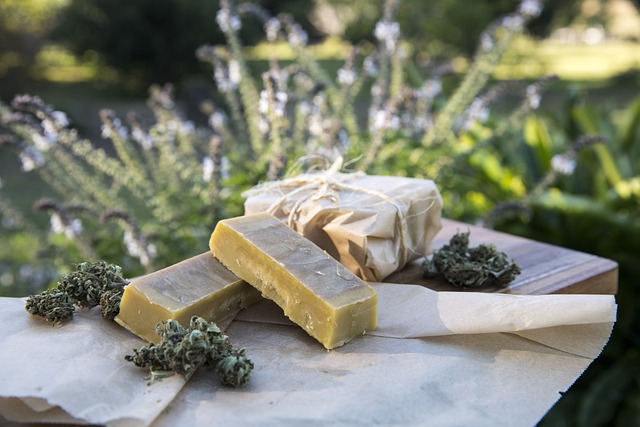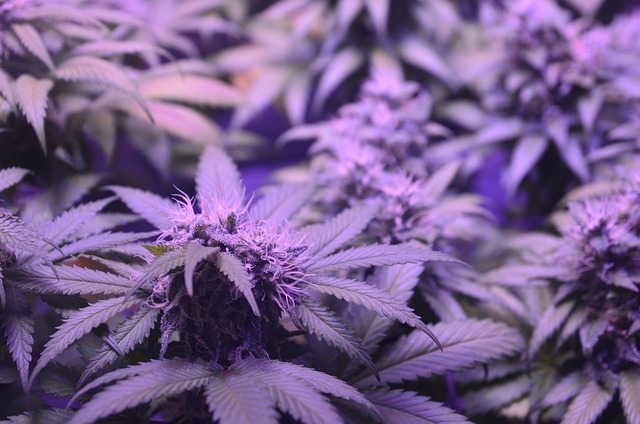THCA flower, a non-psychoactive compound found in cannabis plants, has emerged as a promising therapeutic agent for immune system support. Unlike its psychoactive counterpart THC, THCA engages with the endocannabinoid system via CB1 and CB2 receptors to potentially modulate immune function without altering cognitive states. Studies suggest that THCA flower can offer these benefits through both smoking and edible forms, with the former providing immediate effects by converting THCA to THC and the latter offering sustained support due to the digestive process. The non-psychoactive nature of THCA makes it an attractive option for those seeking immune health benefits without mind-altering effects. The anti-inflammatory properties of THCA are also being investigated for broader contributions to overall immunity and wellness, positioning THCA flower as a significant therapeutic candidate. It’s important to source high-quality, organically farmed THCA flower from reputable cultivators to ensure safety, purity, and efficacy. As with any health supplement, adherence to dosage guidelines and consultation with healthcare professionals are recommended for responsible use in supporting the immune system. With its unique interaction with the endocannabinoid system, THCA flower holds potential as a natural health and wellness solution.
Discover the transformative potential of THCA flower, a natural ally in bolstering your immune system. This comprehensive article delves into the scientific underpinnings of tetrahydrocannabinolic acid (THCA), its role in immunity, and how to harness its benefits safely and effectively. From understanding the endocannabinoid system’s interaction with THCA to exploring cultivation practices for optimal health effects, this article offers a holistic view of integrating THCA flower into your wellness routine. Join us as we navigate the legal landscape, examine historical cultural significance, and provide expert insights on this emerging field of botanical immunity support. Whether you’re seeking natural alternatives or informed by anecdotal evidence, this article is a valuable resource for anyone interested in THCA flower review for immune system health.
- Unveiling THCA Flower: A Natural Immune System Ally
- The Science Behind THCA and Its Impact on Immunity
- Sourcing High-Quality THCA Flower for Optimal Benefits
- THCA Flower: Methods of Consumption and Their Effects
- Understanding the Endocannabinoid System and THCA’s Role
Unveiling THCA Flower: A Natural Immune System Ally

Cannabinoids have garnered significant attention for their potential therapeutic benefits, among which is THCA or tetrahydrocannabinolic acid, a non-psychoactive precursor to THC. Emerging research suggests that THCA flower may hold promise as a natural ally in supporting the immune system. Unlike its psychoactive counterpart, THCA interacts with the body’s endocannabinoid system through CB1 and CB2 receptors, which are key components of the immune response regulation. This interaction may contribute to modulating immune function, making THCA flower a potential alternative for those seeking natural means to bolster their defense mechanisms against pathogens.
The flower form of THCA offers a versatile consumption method that allows for precise dosing and various delivery systems, such as vaporization or infusion into edibles. Unlike smoked cannabis, which can produce harmful byproducts, THCA flower preserves the acidic form of the compound in its natural state until it is decarboxylated through heat, converting it into THC. This process can be controlled to maintain THCA’s potential immune-supporting properties, making it a compelling option for those looking to leverage cannabinoids for immune health without psychoactive effects. The anti-inflammatory and neuroprotective attributes of THCA are also being studied for their implications in enhancing overall immunity and well-being.
The Science Behind THCA and Its Impact on Immunity

Delta-9-tetrahydrocannabinolic acid (THCA), the non-psychoactive precursor to the well-known compound delta-9-tetrahydrocannabinol (THC), has garnered attention for its potential therapeutic properties, particularly in relation to the immune system. THCA is found abundantly in raw cannabis plants, including the THCA flower, and possesses a unique profile of chemical structures that may influence immunomodulatory functions. Scientific studies suggest that THCA interacts with the body’s endocannabinoid system through two primary receptors: CB1 and CB2. While CB1 receptors are predominantly found in the central nervous system, CB2 receptors are more prevalent in peripheral organs, including cells and tissues of the immune system.
Research indicates that THCA’s engagement with these receptors may promote a balanced immune response by modulating cytokine production, which plays a crucial role in inflammation and immune regulation. This action could potentially be beneficial for conditions where either immunity is too high or too low, such as autoimmune diseases or compromised immune systems. The anti-inflammatory properties of THCA are also thought to contribute to its potential immunomodulatory effects. As a result, the use of THCA flower for immune system support is an emerging area of interest in natural health and wellness practices, with ongoing research continuing to unravel its complex mechanisms within the human body.
Sourcing High-Quality THCA Flower for Optimal Benefits

When exploring the potential benefits of THCA flower, particularly for immune system support, sourcing high-quality strains is paramount. The journey to obtain THCA flower begins with a diligent search for reputable cultivators who adhere to stringent growing standards. These cultivation practices not only ensure the purity and potency of the raw plant but also reflect in the quality of the immune-boosting compounds it contains. Look for providers who use organic farming methods, as they avoid the use of synthetic fertilizers and pesticides that could compromise both the efficacy of the THCA and its safety for consumption.
Furthermore, the extraction and preservation methods employed post-harvest are equally critical. High-quality THCA flower should undergo a gentle drying and curing process to maintain its natural terpene profile and cannabinoid content. This care in handling ensures that the THCA remains intact, providing the full spectrum of immune-supportive properties without degradation. Consumers seeking THCA flower for immune system benefits should prioritize suppliers who provide transparent testing results, confirming both the presence of THCA and the absence of unwanted contaminants. By selecting a high-quality product from a trusted source, users can maximize the potential advantages that raw cannabis like THCA flower has to offer for immunity support.
THCA Flower: Methods of Consumption and Their Effects

THCA flower, which contains tetrahydrocannabinolic acid (THCA), is a non-psychoactive cannabinoid that has garnered attention for its potential benefits, particularly for immune system support. Consumption methods vary and each method affects the body differently. One of the most common ways to consume THCA flower is by smoking it in a similar fashion to traditional cannabis. This method provides almost immediate effects as the THCA is converted to THC upon heating, which then interacts with the endocannabinoid system. Smoking can offer rapid immune support and provide relief from inflammation due to its anti-inflammatory properties. Another consumption method is through the preparation of edibles, where THCA flower is infused into food items. This method offers a longer duration of effects as it must first pass through the digestive system before being metabolized. The onset of effects is slower but can last significantly longer, making it suitable for sustained immune system support. Additionally, certain preparation techniques like decarboxylation can be used to convert THCA into THC if desired effects are psychoactive ones. Regardless of the method chosen, it’s crucial to adhere to dosage guidelines and consult with a healthcare professional before incorporating THCA flower into any wellness regimen, especially for immune system support. Users should also be aware of their local laws and regulations regarding cannabis products.
Understanding the Endocannabinoid System and THCA’s Role

The human body possesses a complex cell-signaling system known as the endocannabinoid system (ECS), which plays a pivotal role in maintaining homeostasis. This intricate network is composed of three core components: endocannabinoids, receptors, and enzymes. Endocannabinoids are naturally occurring compounds that resemble the active components found in cannabis, known as cannabinoids. The ECS helps regulate a myriad of functions and processes, including mood, appetite, pain sensation, memory, reproduction, and immune response. Among the many cannabinoids, tetrahydrocannabinolic acid (THCA) is one that has garnered attention for its potential interactions with the ECS, particularly in modulating the immune system. THCA is the non-psychoactive precursor to Delta-9-tetrahydrocannabinol (THC), the primary psychoactive component of cannabis. Research suggests that THCA interacts primarily with CB1 and CB2 receptors within the ECS, potentially offering immunomodulatory effects without the psychoactive impact associated with THC. This makes THCA flower an appealing option for those seeking to harness the potential benefits of cannabinoids for immune system support, without the mind-altering effects typically linked to cannabis consumption. As such, THCA flower is being explored as a therapeutic agent in various natural health practices, with ongoing studies aiming to elucidate its full scope of influence on the body’s regulatory systems.
THCA flower, a naturally occurring compound within the cannabis plant, has emerged as a potential ally in bolstering the immune system. This article has delved into the multifaceted aspects of THCA, shedding light on its scientific foundations and the ways it interacts with our body’s immune responses. By sourcing high-quality THCA flower and exploring various consumption methods, users can harness its immunological benefits effectively. Understanding the intricacies of the endocannabinoid system further clarifies how THCA fits into this vital regulatory network. In light of these insights, incorporating THCA flower as a dietary supplement may offer significant support for immune health. As research continues to evolve, the potential applications and benefits of THCA flower in immune system wellness are becoming increasingly apparent.
